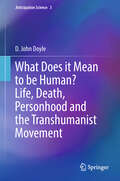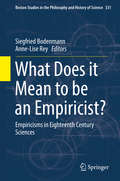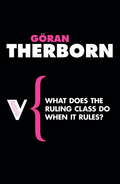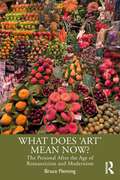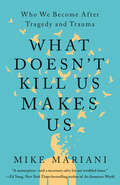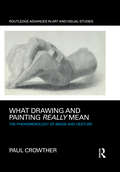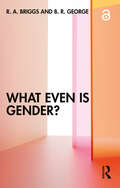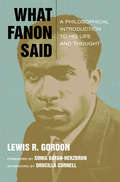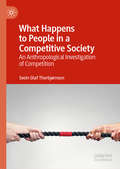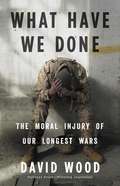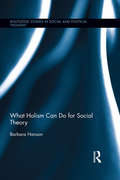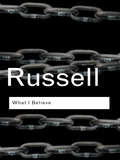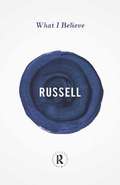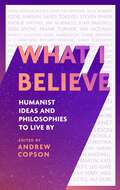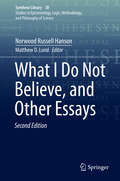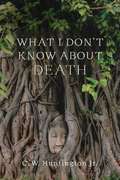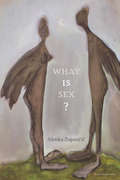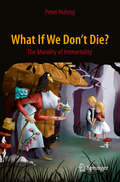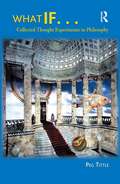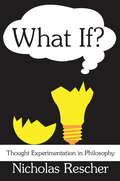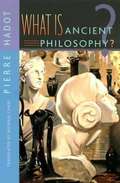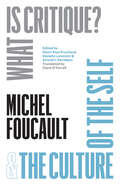- Table View
- List View
What Does it Mean to be Human? Life, Death, Personhood and the Transhumanist Movement (Anticipation Science #3)
by D. John DoyleThis book is a critical examination of the philosophical and moral issues in relation to human enhancement and the various related medical developments that are now rapidly moving from the laboratory into the clinical realm. In the book, the author critically examines technologies such as genetic engineering, neural implants, pharmacologic enhancement, and cryonic suspension from transhumanist and bioconservative positions, focusing primarily on moral issues and what it means to be a human in a setting where technological interventions sometimes impact strongly on our humanity. The author also introduces the notion that death is a process rather than an event, as well as identifies philosophical and clinical limitations in the contemporary determination of brain death as a precursor to organ procurement for transplantation. The discussion on what exactly it means to be dead is later applied to explore philosophical and clinical issues germane to the cryonics movement. Written by a physician/ scientist and heavily referenced to the peer-reviewed medical and scientific literature, the book is aimed at advanced students and academics but should be readable by any intelligent reader willing to carry out some side-reading. No prior knowledge of moral philosophy is assumed, as the various key approaches to moral philosophy are outlined early in the book.
What Does it Mean to be an Empiricist?: Empiricisms in Eighteenth Century Sciences (Boston Studies in the Philosophy and History of Science #331)
by Siegfried Bodenmann Anne-Lise ReyThis book begins with an observation: At the time when empiricism arose and slowly established itself, the word itself had not yet been coined. Hence the central question of this volume: What does it mean to conduct empirical science in early modern Europe? How can we catch the elusive figure of the empiricist?Our answer focuses on the practices established by representative scholars. This approach allows us to demonstrate two things. First, that empiricism is not a monolith but exists in a plurality of forms. Today’s understanding of the empirical sciences was gradually shaped by the exchanges among scholars combining different traditions, world views and experimental settings. Second, the long proclaimed antagonism between empiricism and rationalism is not the whole story. Our case studies show that a very fruitful exchange between both systems of thought occurred. It is a story of integration, appropriation and transformation more than one of mere opposition. We asked twelve authors to explore these fascinating new facets of empiricisms. The plurality of their voices mirrors the multiple faces of the concept itself. Every contribution can be understood as a piece of a much larger puzzle. Together, they help us better understand the emergence of empiricism and the inventiveness of the scientific enterprise.
What Does the Ruling Class Do When it Rules?: State Apparatuses and State Power under Feudalism, Capitalism and Socialism
by Goran TherbornIn his new book, Göran Therborn – author of the now standard comparative work on classical sociology and historical materialism, Science, Class and Society – looks at successive state structures in an arrestingly fresh perspective. <P><P>Therborn uses the formal categories of modern system analysis – input mechanisms, processes of transformation, output flows – to advance a substantive Marxist analysis of state power and state apparatuses. His account of these is comparative in the most far-reaching historical sense: its object is nothing less than the construction of systematic typology of the differences between the feudal state, the capitalist state and the socialist state. Therborn ranges from the monarchies of mediaeval Europe through the bourgeois democracies of the west in the 20th century to the contemporary regimes in Russia, Eastern Europe and China. The book ends with a major analytic survey of the strategies of working class parties for socialism, from the Second International to the Comintern to Eurocommunism, that applies the structural findings of Therborn’s enquiry in the ‘Future as History’. Written with lucidity and economy, What Does the Ruling Class Do when it Rules? represents a remarkable sociological and political synthesis.
What Does ‘Art’ Mean Now?: The Personal After the Age of Romanticism and Modernism
by Bruce FlemingWhat Does ‘Art’ Mean Now? asks, and answers, fundamental questions about the nature of aesthetic experience and role of the arts in contemporary society. The Modern Age, Romanticism and beyond, viewed art as something transcending and separated from life, and usually something encountered in museums or classrooms. Nowadays, however, art tends to be defined not by a commonly agreed-upon standard of “quality” or by its forms, such as painting and sculpture, but instead by political and ideological criteria. So how do we connect with the works in museums whose point was precisely that they stood apart from such considerations? Can we and should we be educated to “appreciate” art—and what does it do for us anyway? What are we to make of the so-different newer works—installations, performances, excerpts from the world—held to be art that increasingly make it into museums? Adopting a subjectivist approach, this book argues that in the absence of a universal judgment or standard of taste, the experience of art is one of freedom. The arts give us the means to conceptualize our lives, showing us ourselves as we are and as we might wish—or not wish—to be, as well as where we have been and where we are going. It will appeal to scholars of sociology, philosophy, museum studies, and art history, and to anyone interested in, or puzzled by, museums or college courses and their presentation of art today.
What Doesn't Kill Us Makes Us: Who We Become After Tragedy and Trauma
by Mike Mariani&“A bold and intricate exploration of catastrophe as not just a transformative experience or a test case for resilience, but something that completely reinvents us—a reincarnation.&”—Robert Kolker, #1 New York Times bestselling author of Hidden Valley Road &“A masterpiece—a book that truly captures what it means to be changed by tragedy, and a necessary salve for our troubled times.&”—Ed Yong, New York Times bestselling author of An Immense World and I Contain Multitudes&“What doesn&’t kill us makes us stronger,&” the adage—adapted from Nietzsche&’s famous maxim—goes. But how much truth is there to that ubiquitous, inexhaustible saying? Tracing the lives of six people who have experienced profoundly life-changing events, journalist Mike Mariani explores the nuances and largely uncharted territory of what happens after one&’s life is severed into a before and after. If what doesn&’t kill us does not necessarily make us stronger, he asks, what does it make us?When his own life was transformed by the onset of a chronic illness, Mariani turned inward, changing his bustling, exuberant lifestyle into something more contemplative and deliberate. In this ambitious work of narrative reporting, he uses his own experience, as well as lessons from psychology, literature, mythology, and religion, to tell the stories of people living what he describes as &“afterlives.&” His subjects&’ harrowing episodes range from a paralyzing car crash to a personality-altering traumatic brain injury to an accidental homicide that resulted in a sentence of life imprisonment. Their &“afterlives,&” Mariani argues, have compelled them to supercharge their identities, narrowing and deepening their focus to find a sense of meaning—whether through academia or religion or ministering to others—in lives sundered by tragedy. Only then can these people truly reinvent themselves, testifying to their own unseen multitudes and the valiant mutability of the human spirit.Delving into lives we rarely see in such meticulous detail—lives filled with struggle, loss, perseverance, transformation, and triumph—Mariani leads us into some of the darkest corners of human existence, only to reveal our endless capacity for kindling new light.
What Drawing and Painting Really Mean: The Phenomenology of Image and Gesture (Routledge Advances in Art and Visual Studies)
by Paul CrowtherThere are as many meanings to drawing and painting as there are cultural contexts for them to exist in. But this is not the end of the story. Drawings and paintings are made, and in their making embody unique meanings that transform our perception of space-time and sense of finitude. These meanings have not been addressed by art history or visual studies hitherto, and have only been considered indirectly by philosophers (mainly in the phenomenological tradition). If these intrinsic meanings are explained and further developed, then the philosophy of art practice is significantly enhanced. The present work, accordingly, is a phenomenology of how the gestural and digital creation of visual imagery generates self-transformation through aesthetic space.
What Even Is Gender?
by R. A. Briggs B. R. GeorgeDebates about gender are everywhere. Is it an inner identity, a biological fact, or an oppressive system? Should we respect it or resist it? What Even Is Gender? shifts the conversation in a fresh direction, arguing that these debates rest on a shared mistake: the idea that there is one thing called "gender" that both sides are arguing about. The authors distinguish a range of phenomena that established vocabulary often lumps together. This sheds light on the equivocations and false dichotomies of "gender" talk, and how they deny many of us the tools to make our needs, experiences, and concerns intelligible to others or even to ourselves. The authors develop a conceptual toolkit that helps alleviate the harms that result from the limitations of familiar approaches. They propose a pluralistic concept of "gender feels" that distinguishes among our experiences of diverse facets of gendered life. They develop a flexible approach to gender categories that reflects the value of self-determination. And they suggest that what we need is not one universal language of gender but an awareness of individual variation and a willingness to adjust to changing contexts and circumstances. A bold and thought-provoking approach to thinking about gender, What Even Is Gender? will be of great interest to those in philosophy, gender studies, sociology, and LGBTQIA+ studies.
What Fanon Said: A Philosophical Introduction to His Life and Thought (Just Ideas)
by Lewis R. GordonAntiblack racism avows reason is white while emotion, and thus supposedly unreason, is black. Challenging academic adherence to this notion, Lewis R. Gordon offers a portrait of Martinican-turned-Algerian revolutionary psychiatrist and philosopher Frantz Fanon as an exemplar of “living thought” against forms of reason marked by colonialism and racism. Working from his own translations of the original French texts, Gordon critically engages everything in Fanon from dialectics, ethics, existentialism, and humanism to philosophical anthropology, phenomenology, and political theory as well as psychiatry and psychoanalysis.Gordon takes into account scholars from across the Global South to address controversies around Fanon’s writings on gender and sexuality as well as political violence and the social underclass. In doing so, he confronts the replication of a colonial and racist geography of reason, allowing theorists from the Global South to emerge as interlocutors alongside northern ones in a move that exemplifies what, Gordon argues, Fanon represented in his plea to establish newer and healthier human relationships beyond colonial paradigms.
What Gender Is, What Gender Does
by Judith RoofWhat Gender Is, What Gender Does provides a forceful new paradigm for considering genders. With depth and insight, Judith Roof argues that genders are much more than binary. And they are constantly morphing: they are conscious and unconscious, simultaneously conventional and idiosyncratic. At any moment, more than one gender dynamic is at work in any individual.Roof&’s interpretation of genders isn&’t content with either biological duality or endlessly open performativity, and what results is a nuanced and surprising representation of gender—an account that captures the complexities of lived experience as well as lived ideology. For Roof, genders are interacting sets of operations that link individual desires to multiple, shifting manifestations of sociocultural positioning and self-presentation. Thus, &“to gender&” is to signal, mask, suggest, mislead, and simplify the uncontainable chaos of desires characteristic of subjects but roundly contained by society.Drawing illustrative material from contemporary popular culture productions, including My Big Fat Greek Wedding, Spider-Man, Shrek, Shallow Hal, Sex and the City, Bridesmaids, Bond films, and &“bromance&” movies, What Gender Is, What Gender Does demonstrates how the persistent conflation of gender and sexual difference is, on the one hand, a simple taxonomic urge and, on the other, a cover that offers the security of identity in place of the frustrations and fears of the real asymmetries of personal power dynamics.
What Happens to People in a Competitive Society: An Anthropological Investigation of Competition
by Svein Olaf ThorbjørnsenIn this book, author Svein Olaf Thorbjørnsen probes the question: What is at stake for human beings in a society dominated by competition, particularly economic competition? Is competition endemic to human nature? Does it preserve the dignity and intrinsic value of the human being? Does it secure better living conditions? In a way, the answer to these queries is a simple “yes.” It can allow for superior satisfaction of fundamental needs; legitimate self-love and self-realization; and encourage positive feelings upon mastering a skill. At the same time, however, competition can also contribute to a strong materialistic self-interest and support classicism, social ranking, and elitism: other human beings become only means to a personal success, thus jeopardizing fellowship and collaboration. In a hyper-competitive environment, some of the same positive human values mentioned above—self-love, self-realisation, individuality, and freedom—can be viewed to pose a threat to the realisation of one’s potential and to one’s true humanity. These competing, contradictory aspects of competition are presented and discussed from perspectives across varying disciplines, from social anthropology and economics to history, ethics, philosophy and theology.
What Have We Done: The Moral Injury of Our Longest Wars
by David WoodFrom Pulitzer Prize-winning journalist David Wood, a battlefield view of moral injury, the signature wound of America's 21st century wars. Most Americans are now familiar with Post Traumatic Stress Disorder (PTSD) and its prevalence among troops. In this groundbreaking new book, David Wood examines the far more pervasive yet less understood experience of those we send to war: moral injury, the violation of our fundamental values of right and wrong that so often occurs in the impossible moral dilemmas of modern conflict. Featuring portraits of combat veterans and leading mental health researchers, along with Wood's personal observations of war and the young Americans deployed in Iraq and Afghanistan, WHAT HAVE WE DONE offers an unflinching look at war and those who volunteer for it: the thrill and pride of service and, too often, the scars of moral injury.Impeccably researched and deeply personal, WHAT HAVE WE DONE is a compassionate, finely drawn study of modern war and those caught up in it. It is a call to acknowledge our newest generation of veterans by listening intently to them and absorbing their stories; and, as new wars approach, to ponder the inevitable human costs of putting American "boots on the ground."
What Holism Can Do for Social Theory (Routledge Studies in Social and Political Thought #91)
by Barbara HansonThis book reconsiders the nature of positivist philosophy in social science theory based on classical and medieval thought in what later became "Europe." It argues that social theory is being held back by antagonistic debates over science, positivism, objectivity, and universal law - debates which appear unnecessary, narrow, and acontextual when their origins are examined. Positing that solutions to these impasses can be found by moving to alternative holistic epistemology, and looking at issues in terms of interrelations rather than parts, the book shows the promise of a social theory that provides a unit of analysis that mediates between local and global relations.
What I Believe (Routledge Classics)
by Bertrand RussellAlong with Why I Am Not a Christian, this essay must rank as the most articulate example of Russell's famed atheism. It is also one of the most notorious. Used as evidence in a 1940 court case in which Russell was declared unfit to teach college-level philosophy, What I Believe was to become one of his most defining works. The ideas contained within were and are controversial, contentious and - to the religious - downright blasphemous. A remarkable work, it remains the best concise introduction to Russell's thought.
What I Believe (Routledge Great Minds)
by Bertrand RussellBertrand Russell is widely regarded as one of the greatest philosophers of the twentieth century and a brilliant writer and commentator on social and political affairs. What I Believe offers a lucid and concise insight into Russell’s thinking on issues that preoccupied him throughout his life: atheism, religious morality and the impact of science on society. With the addition of two further essays, 'Why I Took to Philosophy' and 'How I Write', this is a superb example of Russell as his very best. With a foreword by Alan Ryan.
What I Believe: Humanist ideas and philosophies to live by
by Andrew CopsonDiscover the rich diversity of non-religious thought today in this inspiring collection of interviews with over thirty different humanists in the public eye, including Stephen Fry, Sandi Toksvig and Alice Roberts. Humanists UK Chief Executive Andrew Copson speaks to actors, authors, activists and more to find out what they believe and the values, convictions and opinions they live by. Inspired by the 'What I Believe' essays of two humanist greats - the philosopher Bertrand Russell and the novelist E M Forster - this book opens a window to different humanist perspectives of today. The humanist view of life is progressive and dynamic. All ideas, values, and beliefs are open to question and in this book you will find inspiration to shape your own worldview. Featuring interviews with Jim Al-Khalili, Joan Bakewell, Sarah Bakewell, Sian Berry, Susan Blackmore, Helen Czerski, Alf Dubs, Janet Ellis, Stephen Fry, Rebecca Goldstein, A C Grayling, Natalie Haynes, Leo Igwe, Mike Little, Ian McEwan, Eddie Marsan, S I Martin, Tim Minchin, Diane Munday, Christina Patterson, Hannah Peel, Kate Pickett, Steven Pinker, Nichola Raihani, Alice Roberts, Paul Sinha, Dan Snow, Sandi Toksvig, Frank Turner, Nigel Warburton and Richard Wiseman.
What I Believe: Humanist ideas and philosophies to live by
by Andrew CopsonDiscover the rich diversity of non-religious thought today in this inspiring collection of interviews with over thirty different humanists in the public eye, including Stephen Fry, Sandi Toksvig and Alice Roberts. Humanists UK Chief Executive Andrew Copson speaks to actors, authors, activists and more to find out what they believe and the values, convictions and opinions they live by. Inspired by the 'What I Believe' essays of two humanist greats - the philosopher Bertrand Russell and the novelist E M Forster - this book opens a window to different humanist perspectives of today. The humanist view of life is progressive and dynamic. All ideas, values, and beliefs are open to question and in this book you will find inspiration to shape your own worldview. Featuring interviews with Jim Al-Khalili, Joan Bakewell, Sarah Bakewell, Sian Berry, Susan Blackmore, Helen Czerski, Alf Dubs, Janet Ellis, Stephen Fry, Rebecca Goldstein, A C Grayling, Natalie Haynes, Leo Igwe, Mike Little, Ian McEwan, Eddie Marsan, S I Martin, Tim Minchin, Diane Munday, Christina Patterson, Hannah Peel, Kate Pickett, Steven Pinker, Nichola Raihani, Alice Roberts, Paul Sinha, Dan Snow, Sandi Toksvig, Frank Turner, Nigel Warburton and Richard Wiseman.
What I Do Not Believe, and Other Essays (Synthese Library #38)
by Norwood Russell HansonFifty years have passed since Norwood Russell Hanson's unexpected death, yet he remains an important voice in philosophy of science. This book is a revised and expanded edition of a collection of Hanson's essays originally published in 1971, edited by Stephen Toulmin and Harry Woolf. The new volume features a comprehensive introduction by Matthew Lund (Rowan University) and two new essays. The first is "Observation and Explanation: A Guide to Philosophy of Science", originally published as a posthumous book by Harper and Row. This essay, written near the end of Hanson’s life, represents his mature philosophy of science. The second new addition, Hanson's essay "The Trial of Galileo", is something of a "lost" work – it was only published in a small run collection on famous trials and was left out of the published lists of Hanson’s works. Ever the outspoken firebrand, Hanson found many lessons and warnings from Galileo's trial that were relevant to Cold War America.This volume not only contains Hanson's best-known work in history and philosophy of science, but also highlights the breadth of his philosophical thought. Hanson balanced extreme versatility with a unified approach to conceptual and philosophical problems. Hanson's central insight is that philosophy and science both strive to render the world intelligible -- the various concepts central to our attempts to make sense of the world are interdependent, and cannot operate, or even be fully understood, independently. The essays included in this collection present Hanson's thinking on religious belief, theory, observation, meaning, cosmology, modality, logic, and philosophy of mind. This collection also includes Hanson's lectures on the theory of flight, Hanson's greatest passion.
What I Don't Know about Death: Reflections on Buddhism and Mortality
by C.W. Huntington Jr.A Buddhist scholar reflects on life, death, and the ways we blind ourselves to the inevitable as he confronts his own mortality.In the winter of 2020 a renowned scholar of Asian religions, lifelong meditator, and novelist accustomed to vigorous health received a terminal diagnosis. By summer his cancer had run its course. In the short time in between, C. W. &“Sandy&” Huntington faced his own impending death, leading him to reconsider the teachings and practices, as well as philosophy and literature, he had spent a lifetime pursuing. In this, his last book, you&’ll join Sandy as he traverses the gap between knowledge and true wisdom. &“Sandy Huntington urges his readers to face up to life&’s fragility as well as its many gifts. Written with elegance and verve, What I Don&’t Know about Death is a deep meditation on what it means both to wake up to and to let go of life. Drawing on his lifelong engagement with Buddhism, Huntington remains a consummate teacher who demands intellectual honesty, humility, and compassion from his readers no less than from himself. This book is an intellectual and spiritual offering to Huntington&’s students, past and future.&”—Leora Batnitzky, Ronald O. Perelman Professor of Jewish Studies and professor of religion, Princeton University &“What I Don&’t Know about Death is a deeply personal, intellectually rigorous, and philosophically profound exploration of death, and in particular of Sandy&’s own death, which he faced with exemplary grace, honesty, and clarity as he wrote this book. This is a gift of remarkable beauty that can open our hearts and minds to this most difficult topic. Read it and weep, with tears of grief, gratitude, and illumination.&”—Jay L. Garfield, Smith College and the Harvard Divinity School
What IS Sex? (Short Circuits)
by Alenka ZupancicWhy sexuality is at the point of a “short circuit” between ontology and epistemology.Consider sublimation—conventionally understood as a substitute satisfaction for missing sexual satisfaction. But what if, as Lacan claims, we can get exactly the same satisfaction that we get from sex from talking (or writing, painting, praying, or other activities)? The point is not to explain the satisfaction from talking by pointing to its sexual origin, but that the satisfaction from talking is itself sexual. The satisfaction from talking contains a key to sexual satisfaction (and not the other way around)—even a key to sexuality itself and its inherent contradictions. The Lacanian perspective would make the answer to the simple-seeming question, “What is sex?” rather more complex. In this volume in the Short Circuits series, Alenka Zupančič approaches the question from just this perspective, considering sexuality a properly philosophical problem for psychoanalysis; and by psychoanalysis, she means that of Freud and Lacan, not that of the kind of clinician practitioners called by Lacan “orthopedists of the unconscious.” Zupančič argues that sexuality is at the point of a “short circuit” between ontology and epistemology. Sexuality and knowledge are structured around a fundamental negativity, which unites them at the point of the unconscious. The unconscious (as linked to sexuality) is the concept of an inherent link between being and knowledge in their very negativity.
What If We Don't Die?
by Peter HulsrojThis book deals with the very real possibility of earthly immortality and the human and societal implications of such immortality, including whether it is desirable. It looks at what makes immortality appear so attractive and at the possibility that we would be better served with longer lives and the freedom to terminate our lives at the time when life has given us all the joy, inspiration and personal development it possibly could. What If We Don't Die? - Presents major moral dilemmas associated with human immortality, something which seems imminent due to rapidly progressing biomedical research. - Touches on big questions: is it acceptable that the immortal generation will be the last? How much life do you want? What is the purpose of life if life never ends? - Will trigger your imagination by putting a new spin on free will, current concepts of time and eternity, the possibility of multiple universes and multiple yous. What If We Don't Die? draws extensively on philosophical and religious thought on the purpose of life and introduces novel perspectives on existence, personality and immortality based, for instance, on quantum mechanics and multiverse theory.
What If...: Collected Thought Experiments in Philosophy
by Peg TittleWhat If. . .Collected Thought Experiments in Philosophy is a brief collection of over 100 classic and contemporary “thought experiments,” each exploring an important philosophical argument. These thought experiments introduce students to the kind of disciplined thought required in philosophy, and awaken their intellectual curiosity. Featuring a clear and conversational writing style that doesn't dilute the ideas, the value of the book is in its simplicity–in both format and tone. Each thought experiment is accompanied by commentary from the author that explains its importance and provides thought-provoking questions, all encapsulated on two pages.
What If?: Thought Experimentation in Philosophy
by Nicholas RescherThought experimentation has been a staple of philosophical methodology since classical antiquity, when Xenophanes of Colophon speculated that if horses had gods, they would be equine in form. Nicholas Rescher's What If? undertakes a systematic survey of the role and utility of thought experiments in philosophy. After surveying the historical issues, Rescher examines the principles involved, and explains the conditions under which thought experimentation can validly yield instructive results in philosophy. The reader gains understanding of the differences between scientific and philosophical experiments.What If? begins by examining the nature of thought experiments. It presents an overview of how thought experiments have figured in natural science and in historical studies, before moving on to examine how they function as an instrument of philosophical inquiry. After examining thought experiments from the pre-Socratics to the present day, Rescher turns from history to analysis, and examines the modes of reasoning involved in the use of speculative hypotheses in philosophical problem solving. He shows the limitations of speculative ontology, showing that thought experimentation can lead readily to paradox in a way that increasingly diminishes its usefulness. The book concludes by arguing and illustrating how and when it becomes pointless to push speculation, or thought experimentation beyond the limits of intelligibility and cogent sense.Among the principal features of Rescher's book is its elaborate analysis of the appropriate conditions for philosophical thought experimentation. Its cardinal thesis is that there indeed are limits to the appropriateness of this important methodological resource and that transgressing these limits destroys the prospect of drawing any valid lessons for the philosophical enterprise. What If? will be of interest to philosophers, students of philosophy, and theorists of logic and reasoning.
What If?: Twenty-Two Scenarios in Search of Images
by Vilém FlusserAn imagination of possibilities, of miscalculations, of futures off-kilter &“Probability is a chimera, its head is true, its tail a suggestion. Futurologists attempt to compel the head to eat the tail (ouroboros). Here, though, we will try to wag the tail.&” —Vilém Flusser Two years after his Vampyroteuthis Infernalis, the philosopher Vilém Flusser engaged in another thought experiment: a collection of twenty-two &“scenarios for the future&” to be produced as computer-generated media, or technical images, that would break the imaginative logjam in conceiving the social, political, and economic future of the universe. What If? is not just an &“impossible journey&” to which Flusser invites us in the first scenario; it functions also as a distorting mirror held up to humanity. Flusser&’s disarming scenarios of an Anthropocene fraught with nightmares offer new visions that range from the scientific to the fantastic to the playful and whimsical. Each essay reflects our present sense of understanding the world, considering the exploitation of nature and the dangers of global warming, overpopulation, and blind reliance on the promises of scientific knowledge and invention. What If? offers insight into the radical futures of a slipstream Anthropocene that have much to do with speculative fiction, with Flusser&’s concept of design as &“crafty&” or slippery, and with art and the immense creative potential of failure versus reasonable, &“good&” computing or calculability. As such, the book is both a warning and a nudge to imagine what we may yet become and be.
What Is Ancient Philosophy?
by Michael Chase Pierre HadotHadot takes ancient philosophy out of its customary realm of names, dates, and arid abstractions and plants it squarely in the thick of life. Through a meticulous historical reading, he shows how the various schools, trends, and ideas of ancient Greek and Roman philosophy all tended toward one goal: to provide a means for achieving happiness in this life, by transforming the individual's mode of perceiving and being in the world.
What Is Critique?: & The Culture of the Self
by Michel FoucaultNewly published lectures by Foucault on critique, Enlightenment, and the care of the self. On May 27, 1978, Michel Foucault gave a lecture to the French Society of Philosophy where he redefined his entire philosophical project in light of Immanuel Kant’s 1784 text “What Is Enlightenment?” Foucault strikingly characterizes critique as the political and moral attitude consisting in the “art of not being governed like this,” one that performs the function of destabilizing power relations and creating the space for a new formation of the self within the “politics of truth.” This volume presents the first critical edition of this crucial lecture alongside a previously unpublished lecture about the culture of the self and three public debates with Foucault at the University of California, Berkeley, in April 1983. There, for the first time, Foucault establishes a direct connection between his reflections on the Enlightenment and his analyses of Greco-Roman antiquity. However, far from suggesting a return to the ancient culture of the self, Foucault invites his audience to build a “new ethics” that bypasses the traditional references to religion, law, and science.
